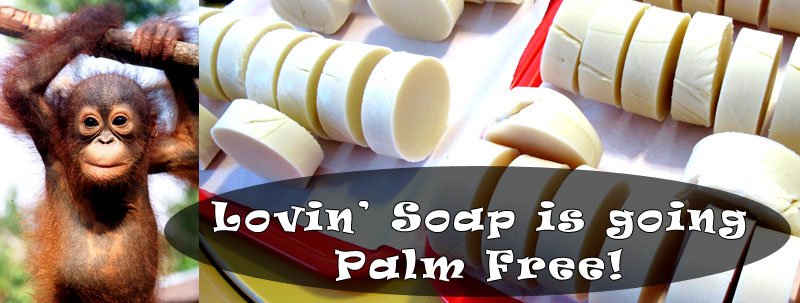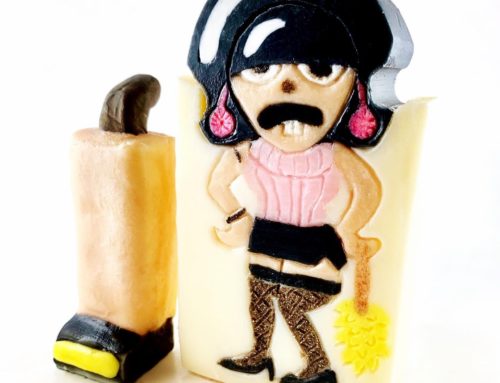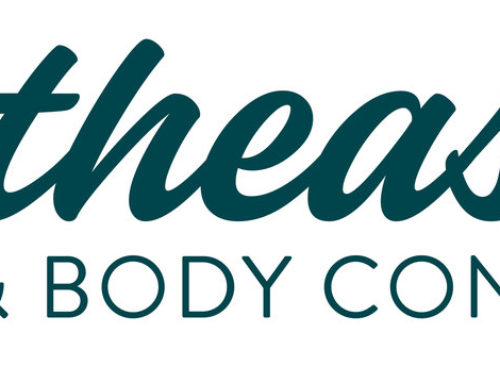I’ve finally made the decision to go completely palm free in my soap and bath and body products.
I’ve been wrestling with the issue for the last couple of years and have done a great deal of research to make my decision. I went palm free in all of my personal soap recipes but then used palm oil in classes. That didn’t make much sense! I thought that maybe using sustainable palm oil was a good solution and also wrestled with telling myself that I’m just a small soapmaker…I couldn’t be making that much of an impact. But it just feels wrong.
I also don’t believe in sustainable palm oil. I believe that it is simply a way to “greenwash” the consumers of the world to make them think they are using palm oil that isn’t resulting in any kind of destruction. After doing some research…I simply don’t buy it.
Here are some great links to get you started in making your own informed decision:
Marla Bosworth has two great posts on going palm free HERE and HERE.
Watch Green The Film HERE.
Learn about the threat HERE.
Adopt an Orangutan HERE. We did! I’ll tell you about that later!
But mostly…I wanted to share with you some great palm free recipes. I’ve formulated several and wanted to test them out side by side to see how they do. I have several testers that will test them for me and hopefully give us some good feedback so we can either improve on the recipe or stamp it as awesome! I’ve soaped five today and plan on soaping five tomorrow.
Let’s talk about what we can use in place of palm oil.
Palm oil is a great base oil. It makes a hard long lasting bar of soap and helps to stabilize the lather. Alot of people like to use it in place of lard or tallow. Which brings up a good point. Lard or tallow is a great substitute for palm oil but I’m personally going for animal free products. So we’re looking for oils that make a hard bar of soap. Three great ones are olive oil, cocoa butter and shea butter. Olive oil?! Most people think of olive oil creating a super soft bar of soap, but have you ever made a 100% olive oil castile bar? After a nice long cure…its super hard. And I mean hard as a rock! You could knock somebody out with that baby. So yes, olive oil is initially quite soft when first unmolding but gets super hard. Most of my palm free recipes have a water discount. Because they do contain a high amount of unsaturated oils (liquid oils such as olive, rice bran or sunflower) it does help to use less water to help them firm up quickly.
The next post I’m going to share with you five palm free recipes that I soaped today.








Hi Soap Chick, very interesting post… I just recently inherited a palm oil supply business from my mom, have been adviced to liquidate it due to its finances but my best friend thinks otherwise… I am 23 years old so the state of my enviroment is very much on my radar which lead me to my own research and I think that boycotting palm oil all together is not the best strategy because if everyone is to take your advice and go for olives and cocoa butter soon some crazy people would clear up a whole forest to meet the demand for olives and cocoa. I think I believe in the strategies of the Round table group for green palm and once I get my new business green stamped, I am looking forward to a future of sustainable innovative palm production… Just to add my twocents, my country Nigeria is the 3rd largest producer of palm oil and Cocoa, a rise in demand for either of them will somehow impact my enviroment, so soap lady should we stop growing apples because it takes up all the land or should we do it with a conscience?
Just wanna comment that you have a really nice website, I love the style and design and it actually stands out.
You should really participate in a contest for among the very best blogs on the web.
I will recommend highly this site!
I am searching for a simple, sure fire recipe using palm kernal flakes. The darn stuff is so very expensive that I probably only will try it one time and don’t want to experiment until I get it right.
Any help would be great. I don’t like to do a lot of different ingredients usually three or four oils.
Thanks very much!
You should take part in a contest for one of the most useful sites on the
net. I will highly recommend this blog!
Thanks for this article. I am just starting to make soap and the palm oil is being shipped when I came across your article. I had no idea and feel so bad for the baby orangutangs. In college I studied the environmental impacts on orangutangs and how quickly deforestation is impacting them as a species. I will try this first 16 ounces of palm oil since its already in the mail but will start out making non palm oil soaps. This is heartbreaking and part of the reason I want to make my own soaps is to not support industries like this. Thank you for the baby orangutangs!!!
Thanks for this article. I have been using palm oil as one of my main oils in my soaps. However, since I’ve heard of the issues with palm oil I’m seriously considering no longer using it as well.
My concern however, is I need to find another oil that has similar properties but I don’t want to use tallow or Crisco. I want to stay vegetarian with my soaps. I suppose I could use Crisco but I’ve heard there are issues with cottonseed oils as well. Anyone have any advice on a good replacement? I usually use a combination of Palm, Coconut, Olive, Canola, Shea butter and castor oils. Thanks.
Yay Soap Chick! That is the real truth! Great using your mind AND your heart together at the same time to figure it out! Literally everything in life causes some sort of trade off. This world was created precisely for us to live in, to enjoy, to use, and to manage the best we can. Everything is not a YES…and everything is not a NO. This freedom to choose between right and wrong is absolutely necessary. It is also where problems come from… when a person operates from a basic foundation of evil (listening to the wrong inner voice) they are INCAPABLE of “doing the right thing.” UNFORTUNATELY… NOT ALL POEPLE ARE CARING and LIFEGIVING PEOPLE. Unregenerated people will always look to what they lust for to lavish upon their own desires (sometimes disgusting or destructive toward others) no matter how badly someone else is hurt in the process. The real foundational problem here; whether it is palm oil, child labor, rape, theft, murder, or the like… is really a condition of each human heart. Do you know who you were created to be? Do you know why you were put on this earth at this time in history? Have you decided to be a life-giver or a life-taker? The answer to these questions and others like them will determine if you are part of the answer or part of the problem. Wouldn’t it be a more wonderful place if we ALL walked more softly toward each other with a big heart of love and took up our responsibility to “manage” what we have been entrusted with in a positive and life-giving way? Of course, no human can be perfect, but often we can do a little better… at the least. Dont’ you think?
While I do think this great and a step closer, a few points here… I went through this struggle myself. Then I thought if palm is bad what else am I doing that’s bad? Everything about soaping apparently! Before everyone thinks they are doing a wonderful thing by boycotting palm take a read online about what else we’re doing. Animal fats I don’t use because I’m Vegetarian and against slaughter a personal choice. Olive Oil is causing many environmental problems. Olive mill waste cannot be safely disposed of and is not easily biodegradable. Coconut Oil has its issues with people climbing those trees risking their lives and the word is getting out on the benefits of it. What do think will happen when that demand rises higher? It’s just used less than Palm or else we would all be hopping up and down about this too. Same as palm they will wreck the planet for a buck. Micas in some countries are mined by small children (slavery footprint), FO’s synthetics & chemicals, colourants, glitters in our waters etc. The amount of plants that goes into making EO’s is astounding. Everything about soaping is not as great as everyone thinks. Palm is in so many food products so we might as well stop eating. I’ve put alot of thought into this post and am not ranting… I’m being realistic here and am rethinking my footprints. I am no better than anyone else because everything I use is causing a negative impact somewhere on this planet. Food for thought before we bash palm users 🙂
Amen. Pick a product–any product–and there will be some negative impact on our environment. To single out just one ingredient is not realistic. I would rather use a little palm to make a superior bar of soap and have people stop using commercial soaps that have a far greater impact on our environment–chemicals, packaging, etc.
Adsense is actually a really great program for those who
maintain blogs, as blogs get updated all the time and the Adsense possibilities are almost limitless.
But unfortunately not every request will get approved.
But it seems Memorial Day wasn’t important enough to Google.
Yeah you, as a novice soap maker, I am looking for organic products that cause as little environmental harm as possible. I applaud your decision and I will also only make palm free soap.
While I respect people’s decisions in going palm free, it saddens me that people aren’t aware and as passionate about the human rights issues surrounding the cocoa industry. You get all of these people shouting about saving the palm trees and don’t trust that sustainable palm is sustainable, yet, they are using cocoa butter coming from Africa where they are experiencing huge slave labor and child slave trafficking issues in the cocoa industry there (which is where most of the chocolate and cocoa giants get their supply from).
Who could say no to that cute, orange face! The fact is I’ve not been to Orangutan country, so I don’t know what’s really going on there. The Global Warming crowd would have you believe that cutting down the rainforests is contributing to climate change, while science would indicate we could cut down every tree on the planet and not loose any CO2 conversion. Oh, yea, it’s all grasses and algea. Soap on!!!
Never have used palm oil; never will. I don’t trust that “sustainable” palm oil is actually “sustainable”. I also strive to avoid PO in our food and other products. Just because something is considered ubiquitous, does not mean we can’t make a difference in our own small way.
Also will sunflower oil in cp. soap turn rancid!
Hi, I feel the same way about using palm oil and I don’t really like the feel of it even though it makes a hard and creamier bar of soap. I use shortening instead because it does make a hard bar and I love the feel of it but have issues with Gmo and wonder what’s really in it. I tried a recipe using sunflower oil and loved the feel of it. Very silky and creamy but makes for a softer bar unless you up the coconut oil and I like to keep it at no more than 25-30%. If anyone has a recipe to share that includes Olive, coconut, sunflower and caster. I would appreciate it. I don’t mind adding cocoa or Shea butter. Looking for a good recipe that isn’t drying but has good lather and makes a hard bar with out using soy or palm oil. Thank you.
Here is a recipe I concocted the other day. The odd number for the coconut oil was because that is what I had left and I wanted to make a large batch of soap and I adjusted the percentages of the other oils to match.
I really like using sunflower oil in my soaps. I think it goes well with the olive oil and the coconut oil and makes for a nice creamy lathering soap.
I use cocoa butter in all my recipes. I like the scent of the cocoa butter and all my recipes are designed to alleviate the itchiness of dry skin.
I usually use about 4 to 5 oz cocoa and Shea butter in my recipes but decided to experiment with more for this recipe.
The cocoa butter leaves a chocolatey scent to my soaps that I like. I usually don’t add scents to my soaps but have discovered that clove essence oil compliments the scent of cocoa butter.
This recipe made 28 – 3/4 inch thick bars that weigh about 4.50 ounces each.
Sunflower/Olive soap 02-09-14
25Oz Sunflower Oil 30%
18 Oz Olive Oil 22%
13.65 Oz Coconut Oil 16%
8 Oz Shea Butter 10%
8 Oz Cocoa Butter 10%
6 Oz Castor Oil 7%
5 Oz Grapeseed Oil 6%
11.32 Oz Lye 5% superfat
Total Weight Oils 83.65 Oz
Hello there! This blog post couldn’t be written much better! Going through this post reminds me of my previous roommate! He continually kept preaching about this. I’ll forward this post to him. Pretty sure he’ll have a very good read. Thanks for sharing!|
Wow that was odd. I just wrote an very long comment but
after I clicked submit my comment didn’t appear. Grrrr… well I’m not writing all that over again.
Regardless, just wanted to say superb blog!
I’m such a newbie to soaping but stumbled upon this thread looking for information about palm oil. I’ve been feeling the same way as you mention in your post that I am not going to use it due to the way it is produced. One thing that I can’t understand though is why people are so anti-tallow and lard. I’ve been rendering my own from fat that I’ve been given from a butcher near me and the only fat that I receive is from organic, grass-fed, HAPPY cows and pigs. The truth is that these animals are raised for food and if he doesn’t give me the tallow or lard it gets thrown out! I feel like that is an incredible waste. Our ancestors would never have allowed such waste.
My very first attempt at soap making was chock full of both tallow and lard and at first it did smell like that which kind of freaked me out since I don’t really want to wash with a soap that makes me smell like a cow or pig…hahaha… This soap did not have any scent added to it. But I was surprised to find that after curing it for only a few days the only scent it had was that of soap! It was amazing to me. But true nonetheless.
I will continue to use tallow and lard in my soap because the way that I get it feels much more sustainable than actually using palm oil which is questionable even when organic and “sustainable”. I only hope that I can explain my reasoning to people enough not to freak them out about it.
I absolutely agree. Vegan/veg people do not like to use animal fats. But I feel if you eat meat…why not use the fat? Thank you so much for your comment.
I appreciate what you are doing and I myself would only buy sustainable palm oil. But I disagree about the olive oil bar once you get it wet. If you use it enough it’s a slimey mess. I dojn’t even like it at 40% which is often the standard with 30/30 coconut and palm. Butters are great but most are very expensive. I tried a recipe that was simply palm and coconut oil on the Elements website and it was wonderful. I think if you used lard or tallow instead it might have a lard odor since it was about 71% palm. Recipes abound on the internet but so many are confusing.
I’ve been an Artisan Soaper for 20+ years and have specialized in 100% pure Organic EVOO Castile bars. They do not get ‘slimy’, nor do they feel ‘slimy’. This is an age old debate.
The success of RSPO is controversial at best, and Greenpeace has repeatedly published articles that the deforestation in Indonesia and Malaysia has continued unabated after 2001, when RSPO was established.
Just a few days ago I read an article in the Financial Times (link: http://www.ft.com/intl/cms/s/0/3e58a6f6-a435-11e1-84b1-00144feabdc0.html#axzz1zkCbSVFs) on the topic – which essentially says that in the very complex palm oil supply chain, it’s next to impossible to be sure that the oil we’re buying as sustainable is not actually mixed with oils produced less ethically.
So while I wouldn’t want to suggest that nobody should use palm oil, because I think that we each need to make our own decisions about which oils we will or will not use, I do think that we should be aware that not all of the oil certified by RSPO is actually sustainably produced. Which is why I made the choice to go palm-free.
However, as I mentioned, the alternatives have their own supply chain concerns. I do use both cocoa and shea butters, mainly because I only learned about the issues with child labour after I’d ordered a good stock. But also because I wanted another solid oil as an alternative to palm, and there weren’t many as readily available as these two. So I have continued to use them, but in smaller measure than before – and I seldom go above 5% with either. (Even though I love soap with a high cocoa butter content!)
In all fairness, there probably aren’t many of the oils we use which are not associated with production “blemishes”, so we each need to make our own choices. But let’s do this with our eyes open. And where possible, we should share what we learn to ensure that “natural soapers” can show that we care about nature …….
I believe that even small, hobbyist soapers like myself can make a difference …… and I pressure my suppliers to learn more about their supply chain, with respect to where the oils they sell come from, and how they’re produced. I recognize that even the “big guys” have trouble securing responsibly produced cocoa butter, so I don’t assume that my suppliers will always succeed where Nestle have failed. But at least my suppliers are aware that this is what I want, and hopefully the groundswell of soapers willing to pay a little extra for responsibly sourced oils will grow.
Don’t underestimate the power of the individual! Each small contribution adds up.
Hooray, Amanda! Every soapmaker can make a difference. We are an industry 80,000 soapers strong.
Some of the folks in this Facebook travel frequently to southeast Asia. Very interesting group at https://www.facebook.com/groups/redapes/
I stopped used palm in my soaps about ten years ago, although not for the same reason you did. After reading about the chemical composition of palm oil in comparison to coconut, it occured to me — if some people think more than 30% coconut is drying AND you also use palm in the recipe on top of that (which is similar in composition), wouldn’t that be doubling the drying problem? I do, however, still use palm in my lip balm.
I think RSPO (Roundtable on Sustainable Palm Oil), a global organization developing and implementing global standards for sustainable palm oil production, has worked to find them. All palm oil sourced from these suppliers comes only from existing palm plantations, not new jungle-clearing projects. Brambleberry in Bellingham Wa sells sustainable palm oil. They are just a mouse click away. Their owner, Anne-Marie Failo (spelling??) is concerned with environmental issues as well and does her best to find responsible suppliers. I dont know if she does wholsale but may be a source of info.
If we want to decrease demand, I am not sure that little soaper turning away from palm oil is going to do that. I think we have to put pressure on the big guys/gals who don’t use sustainable palm oil by not buying their products and a campaign to let them know we are unhappy about their business practices.
I will stop now 🙂 It all comes down to personal preference and we all have to do what we feel is right. If we can’t use Shea butter, palm oil and cocoa butter, that seems to leave us with very expensive alternatives and who know how those are really harvested. 🙁
Amanda, I applaud your decision! I’ve only been making soap for a short time compared to most people who’ve already commented on the post – but decided not to use palm oil from the get-go.
Candy and Beryl: while your point is valid, we are talking about palm oil coming from countries with an incredibly low GDP and different business practices/standards than the USA and Europe, where most authorities (government and NGO’s) adopt a more “flexible” view on how suppliers qualify for “organic”and “responsibly sourced” labels ….. I’m sure that there are suppliers who fully meet the criteria, but it’s very difficult to identify exactly who the truly responsible suppliers are. So I think that the only rational way to prevent further destruction of orangutan habitat is to reduce the demand for the product.
What I will add at this point, is that there is also concern around at least 2 of the alternatives Amanda mentions …… A reasonable proportion of cocoa butter and all/most of the shea butter comes from very poor African countries, where child labour is significant issue. And the problems with the cocoa bean processing in Africa has been in the European news over past few days – particularly following news that some of Nestle’s suppliers are involved in the practice. So the alternatives may not be totally “clean” either,
I totally agree, Amanda. I live in Spain so that I have olive oil available for doing my soaps at a very good price. I reasure that olive oil gives hardness to soap bars, among other properties.
Congratulations for your blog.
Alicia
Congrats! When I first started making soap I stumbled upon these issues and quickly decided to formulate without palm. It’s really not as necessary as it seems but as a newbie almost all recipes include palm so you’re indoctrinated into thinking you can’t make soap without it. I love the adopt an orangutan charity you shared – thank you , I’m going to do the same. 🙂
I agree with Candy here. I’ve been following the controversy surrounding palm oil and the work the Roundtable on Sustainable Palm Oil has been doing for quite some time. Forty per cent of the world’s palm oil producers are now members of the RSPO. I prefer to pressure more suppliers to carry certified sustainable palm oil. (CSPO) to encourage growers to adopt sustainable practices. The more we demand sustainable palm oil, the more the market will supply. Right now I use Spectrum Organic Shortening in my soap. According to their website they partner with an organic family owned business who’s a member of Productive Alliances and who’s farms are certified.
I was wondering how you like soap using Spectrum instead of palm oil? What difference do you find in the soap if any? Thank you.
Every action has a reaction. There seem to be sustainable efforts going in that are legit. By pulling out of using sustainable palm oil & encouraging others to do so, undermines those sustInable efforts. If those efforts fail, then all that is left is what impacts wildlife. You therefore are helping support that which you are trying to avoid. Just sayin… It is a complex issue and you are trying to apply a way too simple solution that could backfire.
Fact…there is no such thing as sustainable palm oil. Trees cant be grown fast enough to compensate for even the small percentage of businesses using from these farms let alone the world. Sustainable palm oil farms are no different then mass produced cow and chicken farms. They are born and pumped with hormones for the sole purpose of feeding the masses. The words “sustainable palm oil” are just a gimmick to make a companies look like they are contributing to a better world when they really arent doing so.
There actually IS sustainable palm oil. You just have to know where to get it. You have to do your homework. There’s no such thing as a blind consumer anymore unless you absolutely don’t care about the earth or all that lives on it. If everyone stops buying palm oil, it would only put increased pressure on another oil market. SO it’s not about not buying palm oil altogether, it’s about buying the RIGHT palm oil. We need to let the growers and manufacturers know WE want only certified, sustainable AND organic palm oil. Which does exist. I’ve done the research because I too care about the rain forests and orangutans, as well as everything else effected by irresponsible and careless farming. Besides all that, coconut oil also has issues. Do you avoid it? Or buy the right one? Oh, and there is palm oil from areas of the world where orangutans don’t even live such as Ecuador. THOSE are the companies we need to support.
This is an OLD post. Things have changed in the palm oil industry. I do believe there are more options now than when I wrote this. Thanks for your comment.
Candy – this is a VERY GOOD Point you have made! If all ethical soapmakers and other buyers of sustainable palm walk away from the only people making sustainable palm oil then they will most likely go broke and have no business to feed their village / families. All that achieves is that this leaves the dirty operators to carry on – and they are the real problem anyway? As always its big business killing the environment for profits – taking support away from ethical farmers does not achieve the goal.
Hi Amanda,
I love that you’ve made this decision. Although I’m new to the industry, I’ve been making CP soaps for the past 3 years. For the same reasons, I’m opting out of palm oil as well. I’ve been researching the benefits of doing this over the past year or so. It will take a bit of time for me to phase out palm oil completely and get rid of my current supply. It’s a decision I feel great about. It’s up to all of us to make better-educated choices to protect our planet and all life on it. Thanks for your part!
Ashley P.
Earth Power Aromatics
Always enjoy your site! I totally agree about the palm issues. I began making soap 2 years ago, and avoided it from the start. Recioes were hard to find that didn’t use it, but now I’ve formulated my own that I’m happy with. I have all-vegetable, and tallow-versions (blind test users actually prefer the tallow). Love the adopting the orangutang idea! Thanks for all you do!